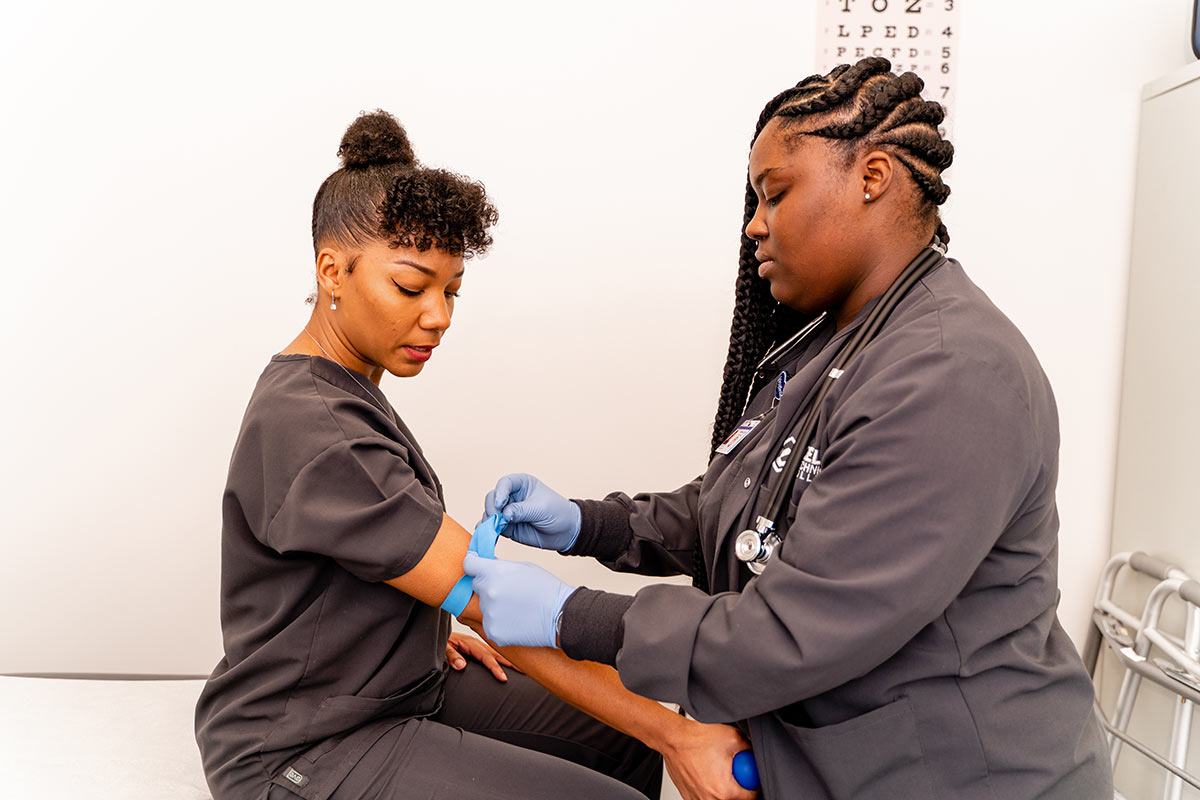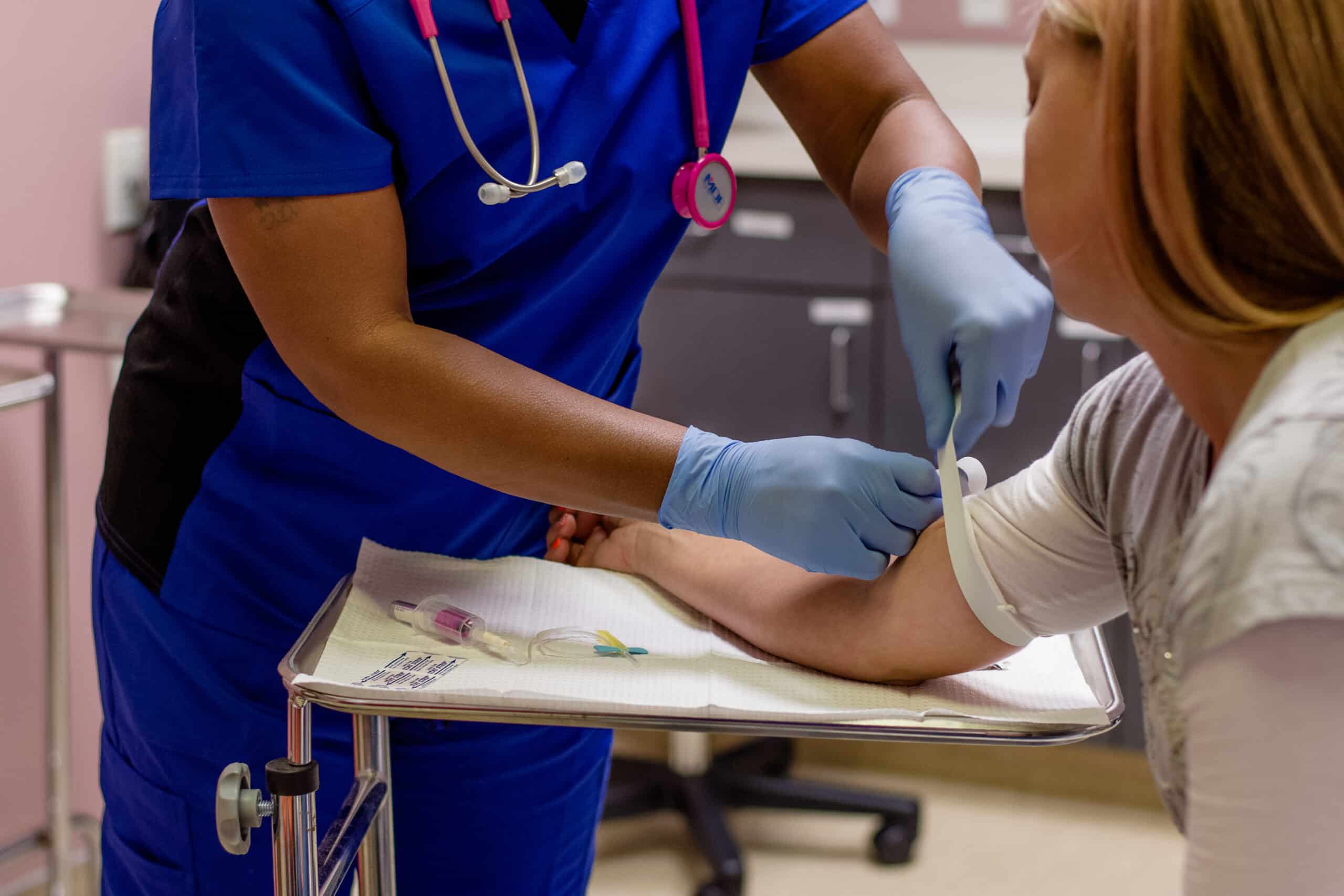Top Topics You Should Know Before Enrolling in a Phlebotomy Training Course
Top Topics You Should Know Before Enrolling in a Phlebotomy Training Course
Blog Article
The Course to Qualification: Understanding the Phlebotomy Educating Course Journey and Its Value
As you think about the course to accreditation in phlebotomy, it is essential to comprehend the role you'll play in health care. Your training will certainly cover essential abilities, from blood collection methods to patient communication. Each component of the program prepares you for the obstacles in advance. What exactly does the journey entail, and why is accreditation so vital for your future profession? Let's discover these questions further.

The Duty of Phlebotomists in Medical Care
Phlebotomists play an essential function in the health care system, serving as the vital web link between individuals and vital diagnostic screening. You'll perform blood draws, making sure examples are gathered accurately and securely. Your know-how assists in detecting medical conditions, checking health, and directing therapy decisions.
In your daily interactions, you'll require to establish count on with people, making them feel comfortable throughout what could be a stressful experience. You're liable for classifying and handling examples carefully to stop contamination or errors, which could impact test outcomes.
Past this, you'll frequently work alongside medical professionals and registered nurses, communicating essential details concerning people' conditions. By understanding your abilities, you contribute meaningfully to client care, making you an important part of the medical team.
Summary of Phlebotomy Training Programs
When discovering phlebotomy training programs, you'll find various types developed to fit different schedules and discovering styles. Each program helps you create necessary abilities like blood collection and patient communication. Recognizing these alternatives is essential to choosing the ideal course for your occupation.
Kinds Of Training Programs
A number of sorts of training programs are readily available for those seeking to come to be skillful in phlebotomy. You can pick from certification programs, which generally last a few months and concentrate on necessary abilities. There are also diploma programs that offer an even more comprehensive education, often lasting approximately a year. If you're searching for a much deeper understanding, an associate level in an associated field may be the appropriate fit. On-line courses provide flexibility for those stabilizing work or family dedications, allowing you to research at your own speed. Furthermore, some hospitals and facilities use on-the-job training programs, providing practical experience while you learn. Whatever path you pick, each program aims to equip you with the needed skills for an effective phlebotomy career.

Secret Abilities Developed
Mastering phlebotomy requires a set of vital skills that are created with detailed training programs. In addition, interaction skills are basic; you'll need to engage with clients, describe treatments, and placed them at ease. Each of these abilities is vital for your success as a licensed phlebotomist, making you a useful asset in any kind of healthcare setup.
Secret Elements of a Phlebotomy Program
In a phlebotomy course, you'll concentrate on necessary topics that lay the groundwork for your future profession. You'll engage in hands-on training that enables you to use what you have actually discovered in real-world setups. Both the core curriculum and useful experience are important for your success as a phlebotomist.
Core Curriculum Introduction
While seeking a phlebotomy training program, you'll experience a curriculum designed to furnish you with fundamental skills and knowledge. Phlebotomy Courses Near Me. This educational program usually consists of anatomy and physiology, concentrating on the blood circulation system and understanding blood components. You'll also discover various kinds of blood collection approaches, including venipuncture and capillary puncture methods
Furthermore, infection control and safety and security protocols are necessary elements, ensuring you understand exactly how to preserve a sterile environment. You'll study patient communication, stressing communication and empathy, which are important for relieving individual stress and anxiety.
Hands-On Training Experience
Obtaining hands-on experience is a crucial part of your phlebotomy training program. This sensible training enables you to use what you've found out in a real-world setup, boosting your abilities and self-confidence. You'll exercise venipuncture techniques, discover how to handle various types of specimens, and get aware of the devices used in the field. Under the guidance of skilled trainers, you'll refine your abilities, ensuring you're planned for any kind of scenario you may deal with.
In addition, you'll get the chance to connect with individuals, which is vital for creating your interaction skills. This combination of technological effectiveness and interpersonal skills is essential for your success as a certified phlebotomist. Inevitably, hands-on training is where theory fulfills practice, strengthening your understanding and preparedness for certification.
Certification and Licensing Demands
Prior to you can start your career in phlebotomy, it is crucial to understand the qualification and licensing needs that vary by state. Most states call for phlebotomists to hold a certification from an identified company, such as the National Phlebotomy Association or the American Culture for Professional Pathology. These qualifications normally entail passing a test that examines your knowledge and skills in the area.
In addition to certification, some states have particular licensing requirements. You might need to complete a certain variety of hours in clinical practice, send evidence of training, or go through a background check. It is essential to research your state's laws to make certain you meet all necessary standards.
Remaining educated about these needs not just assists you secure a setting yet likewise boosts your reputation as a professional. By satisfying these requirements, you'll be well on your way to an effective job in phlebotomy.
Hands-On Training and Practical Experience
Hands-on training and useful experience are vital elements of your phlebotomy education, as they enable you to apply academic understanding in real-world situations. Throughout your training, you'll involve in monitored venipuncture, discover correct techniques, and end up being acquainted with numerous blood collection tools. This direct involvement is essential for developing your confidence and refining your skills.
You'll function closely with seasoned professionals who can assist you via the nuances of person interaction and example handling. Each session not just reinforces your understanding but additionally prepares you for the busy environment of health care setups.
In addition, several programs incorporate professional turnings, allowing you to experience diverse settings, from healthcare facilities to outpatient clinics. This direct exposure helps you adapt to different obstacles and individual requirements, ensuring you're well-prepared for your future duty. Embrace these opportunities, as they're important to becoming a proficient and caring phlebotomist.
Challenges Faced Throughout Training
While obtaining hands-on experience is important, it is necessary to recognize the obstacles that can occur throughout your phlebotomy training. You may run into anxiousness when executing procedures on actual individuals, especially if you're brand-new to the atmosphere. The pressure to get whatever Phlebotomy Classes Near Me right can be frustrating. Additionally, understanding the skills needed for blood attracts takes practice; you may battle with strategy at first.
Time administration can likewise be a hurdle, as harmonizing theory, sensible sessions, and personal commitments can really feel challenging. You may deal with differing finding out speeds amongst your peers, causing feelings of self-doubt if you believe you're falling back. Ultimately, adapting to the different personalities of instructors can be tough, as each may have an unique training style.
Recognizing these obstacles at an early stage can prepare you for success and aid you develop strength throughout your training journey.
Career Opportunities After Certification

As you get experience, you may even take into consideration focusing on areas like pediatric or geriatric phlebotomy, satisfying specific patient demands. Some phlebotomists pick to progress their professions by ending up being research laboratory service technicians or pursuing further education in healthcare fields.
In addition, your accreditation can result in duties in training or supervising new phlebotomists, allowing you to share your knowledge. With the healthcare industry continuously growing, your skills will certainly constantly remain in need, paving the way for a stable and meeting career. Accept the opportunities waiting for you!
Regularly Asked Concerns
What Is the Regular Period of a Phlebotomy Educating Program?
Phlebotomy training courses commonly last around 4 to eight weeks. You'll take part in hands-on method, class direction, and online knowing. Completing this training prepares you for accreditation and a gratifying profession in healthcare.
Are Online Phlebotomy Courses Available?
Yes, on-line phlebotomy programs are available. They offer adaptability and ease, permitting you to research at your very own speed. Simply validate the program is recognized to meet certification needs and obtain valuable abilities for your profession.
Exactly How Much Does Phlebotomy Training Normally Price?
Phlebotomy training usually sets you back in between $700 and $2,500, relying on the program and location. You ought to think about elements like course size, included materials, and hands-on experience when choosing the right training for you.
What Are Usual Requirements for Phlebotomy Training?
Typical prerequisites for phlebotomy training commonly include a secondary school diploma or GED, booster shots, and a history check. Some programs might also call for standard healthcare understanding or qualifications, ensuring you're planned for hands-on training.
Can I Work While Completing My Phlebotomy Training?
Yes, you can function while finishing your phlebotomy training. Several pupils equilibrium work with their research studies, but ensure to handle your time effectively to guarantee you meet both job and training commitments effectively.
Report this page